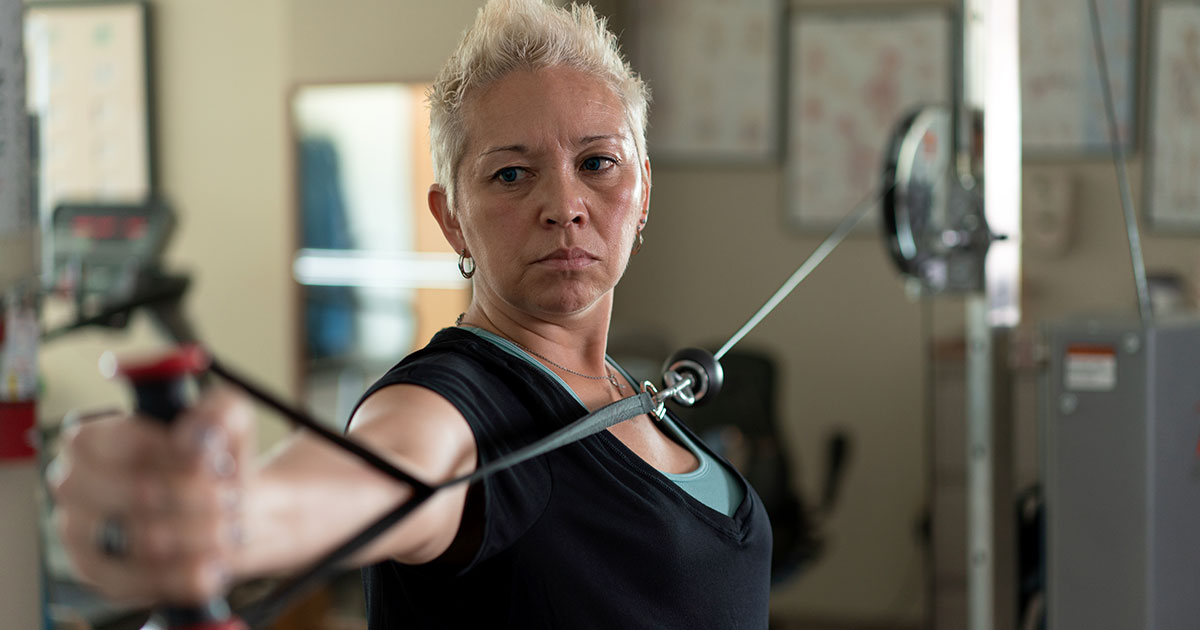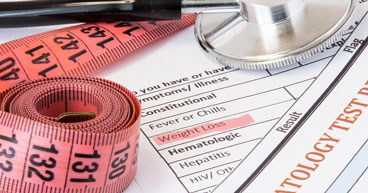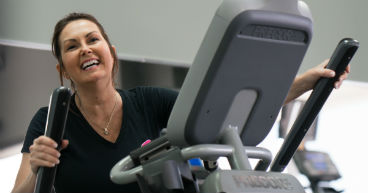
Everyone knows that exercise and regular physical activity are good for you. Even a brisk, 20-minute daily walk can help improve your health immeasurably. Regular physical activity is known to help:
- Improve sleep
- Manage stress and boost mental health
- Reduce the risk of heart attack or stroke
- Combat hypertension
- Strengthen muscle and bones
- Maintain a healthy weight
- Increase energy
- Reduce pain
If you’re looking for more motivation to be physically active, exercise may also reduce the risk of cancer. In a study by the National Institutes of Health (NIH) and the American Cancer Society (ACS) researchers examined the physical activity levels of 1.4 million people over an 11-year period. The study gathered specific information about participants’ exercise habits. Their conclusion: Regular exercise may reduce the risk of up to 13 cancers. The original study was published in 2016 and the ACS updated its guidelines to align with this research in 2020.
In this article we’ll explore:
- Does exercise reduce cancer risk?
- Which cancer types are lower among people who exercise?
- How does exercise reduce the risk of cancer?
- How much exercise do you need?
If you’re interested in getting screened for cancer or if you’ve been diagnosed with cancer and want a second opinion, call us or chat online with a member of our team.
Does exercise reduce cancer risk?
Even elite athletes who exercise for a living get cancer. Cancer’s causes are complex and the disease occurs for a variety of reasons, including:
- Exposure to carcinogens, including toxic chemicals, tobacco smoke, air pollution or radiation, including sunlight
- Viruses, such as the human papilloma virus (HPV) which is linked to several reproductive and head and neck cancers
- Genetics and inherited gene mutations or cancer syndromes
- Poor diet, one that is high in fat, heavy on processed foods and lacking in fruits, vegetables and whole grains
- Obesity and a sedentary lifestyle, which may cause chronic inflammation and excessive hormone production
- Cell replication errors that occur over time and may produce damaged or mutated cells that grow out of control and form tumors
“Diet and exercise and sleeping well and not punishing your body with carcinogens is a good thing, right?” says Stephen Lynch, MD, Vice Chief of Staff at City of Hope® Cancer Center Phoenix. “There's emerging data in the cancer world [about] exercise and the net effects, which impacts things like obesity and cellular stress, [so] it's not surprising that there's overlap in those risk factors.”
Which cancer types are lower among people who exercise?
Overall, participants in the NIH/ACS study who exercised more experienced a 7 percent lower risk for developing any type of cancer than people who exercised less often. Those who were the most active had a reduced risk for the following 13 cancer types, compared to the least active participants:
- Esophageal adenocarcinoma
- Liver cancer
- Lung cancer
- Kidney cancer
- Stomach cancer
- Endometrial cancer
- Myeloid leukemia
- Myeloma
- Colon cancer
- Head and neck cancer
- Rectal cancer
- Bladder cancer
- Breast cancer
How does exercise reduce the risk of cancer?
Exercises unleashes a series of physical reactions in the body, many of which are linked to cancer risk factors. They include those listed below.
Weight Management: Obesity is a known risk factor for multiple cancers, but you can’t lose weight with exercise alone. Weight loss really happens in the kitchen as much as the gym. A healthy diet and regular exercise combined may help to maintain a healthy weight.
Hormone regulation: Fat cells are “estrogen factories,” Dr. Lynch says. And the hormone is linked to some types of breast cancer and endometrial cancers. Exercise may help better regulate estrogen levels and reduce the number of fat cells that produce cancer-feeding hormones.
Immune support: The immune system reacts vigorously to exercise. A 2019 report from sports medicine experts at Appalachian State University suggests that exercise promotes T-cell health, reduces T-cell exhaustion and improves defense activity and metabolic health.
Stress reduction: Regular physical activity helps to reduce stress and anxiety, improve mood and fight depression. Exercise may also lead to better sleep, which, in turn, reduces stress and supports mental health.
Three key points to remember:
- Check with your doctor before launching into an exercise program.
- Exercise is only one ingredient in the recipe for good overall health. Quitting smoking, avoiding alcohol, eating a healthy diet and other lifestyle choices can improve your health and reduce your cancer risk.
- Get regular checkups and screened for cancer as recommended by standard guidelines.
How much exercise do you need?
With so much going on in life, who has time for exercise? The short answer: You do. The U.S. Centers for Disease Control and Prevention (CDC) recommends at least 150 minutes of exercise a week to support good health and reduce disease risk. That’s only 30 minutes a day five days a week.
But any amount of exercise is beneficial.
A study published in the Journal of the American College of Cardiology found that of 55,000 adults studied for 15 years, those who ran for just five to 10 minutes a day lived an average of three years longer than those who didn’t run at all. Daily runners were also 30 percent more likely to beat diseases of all kinds.
Another study found that walking at a brisk pace is just as effective as running in lowering your risk of high blood pressure, high cholesterol and diabetes—the leading causes of heart disease and strokes.
If you’ve been diagnosed with cancer, the benefits of regular exercise are abundant. Daily workouts can help strengthen your body for the fight ahead and brighten your mood and outlook. Cancer patients, though, should be realistic about what to expect of their bodies, especially during treatment. The toll of the disease, and the cancer treatment to fight it, will likely mean you won’t have the same energy level you used to.
Consider the following tips to find a way to shoehorn exercise into a busy life.
Do what you love: Whether it’s walking, swimming, going to the gym or hitting a nature trail, find something that you enjoy doing and makes you happy. You’ll be more likely to stick to it.
Find a buddy: Having company while you sweat may help you to stay motivated.
Set a goal: Make a plan from the outset and commit to sticking to it. Reaching specific benchmarks will add to your sense of self-esteem and confidence.
Track your progress: Wearable gadgets make it easier to track health data, from steps taken to calories burned. And fans say the devices add to the fun of fitness.
If you’re interested in getting screened for cancer or if you’ve been diagnosed with cancer and want a second opinion, call us or chat online with a member of our team.


